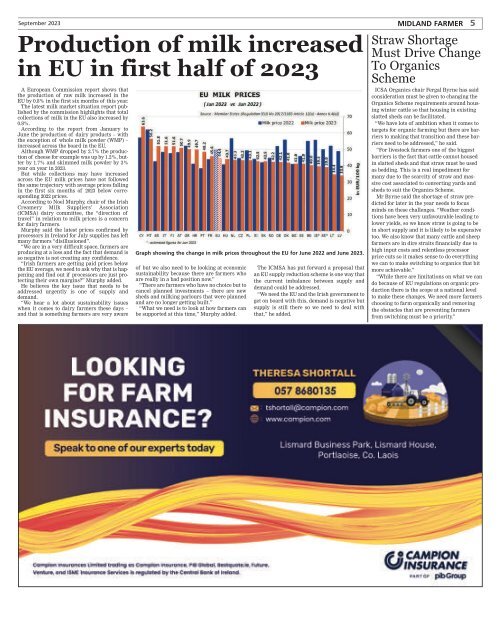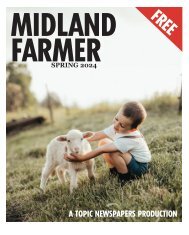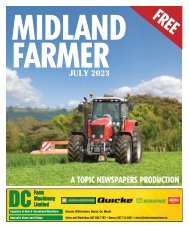You also want an ePaper? Increase the reach of your titles
YUMPU automatically turns print PDFs into web optimized ePapers that Google loves.
<strong>September</strong> <strong>2023</strong><br />
Production of milk increased<br />
in EU in first half of <strong>2023</strong><br />
A European Commission report shows that<br />
the production of raw milk increased in the<br />
EU by 0.8% in the first six months of this year.<br />
The latest milk market situation report published<br />
by the commission highlights that total<br />
collections of milk in the EU also increased by<br />
0.8%.<br />
According to the report from January to<br />
June the production of dairy products – with<br />
the exception of whole milk powder (WMP) –<br />
increased across the board in the EU.<br />
Although WMP dropped by 2.7% the production<br />
of cheese for example was up by 1.2%, butter<br />
by 1.7% and skimmed milk powder by 3%<br />
year on year in <strong>2023</strong>.<br />
But while collections may have increased<br />
across the EU milk prices have not followed<br />
the same trajectory with average prices falling<br />
in the first six months of <strong>2023</strong> below corresponding<br />
2022 prices.<br />
According to Noel Murphy, chair of the Irish<br />
Creamery Milk Suppliers’ Association<br />
(ICMSA) dairy committee, the “direction of<br />
travel” in relation to milk prices is a concern<br />
for dairy farmers.<br />
Murphy said the latest prices confirmed by<br />
processors in Ireland for July supplies has left<br />
many farmers “disillusioned”.<br />
“We are in a very difficult space, farmers are<br />
producing at a loss and the fact that demand is<br />
so negative is not creating any confidence.<br />
“Irish farmers are getting paid prices below<br />
the EU average, we need to ask why that is happening<br />
and find out if processors are just protecting<br />
their own margins?” Murphy added.<br />
He believes the key issue that needs to be<br />
addressed urgently is one of supply and<br />
demand.<br />
“We hear a lot about sustainability issues<br />
when it comes to dairy farmers these days –<br />
and that is something farmers are very aware<br />
Graph showing the change in milk prices throughout the EU for June 2022 and June <strong>2023</strong>.<br />
of but we also need to be looking at economic<br />
sustainability because there are farmers who<br />
are really in a bad position now.”<br />
“There are farmers who have no choice but to<br />
cancel planned investments – there are new<br />
sheds and milking parlours that were planned<br />
and are no longer getting built.”<br />
“What we need is to look at how farmers can<br />
be supported at this time,” Murphy added.<br />
The ICMSA has put forward a proposal that<br />
an EU supply reduction scheme is one way that<br />
the current imbalance between supply and<br />
demand could be addressed.<br />
“We need the EU and the Irish government to<br />
get on board with this, demand is negative but<br />
supply is still there so we need to deal with<br />
that,” he added.<br />
MIDLAND FARMER<br />
5<br />
Straw Shortage<br />
Must Drive Change<br />
To Organics<br />
Scheme<br />
ICSA Organics chair Fergal Byrne has said<br />
consideration must be given to changing the<br />
Organics Scheme requirements around housing<br />
winter cattle so that housing in existing<br />
slatted sheds can be facilitated.<br />
“We have lots of ambition when it comes to<br />
targets for organic farming but there are barriers<br />
to making that transition and these barriers<br />
need to be addressed,” he said.<br />
“For livestock farmers one of the biggest<br />
barriers is the fact that cattle cannot housed<br />
in slatted sheds and that straw must be used<br />
as bedding. This is a real impediment for<br />
many due to the scarcity of straw and massive<br />
cost associated to converting yards and<br />
sheds to suit the Organics Scheme.<br />
Mr Byrne said the shortage of straw predicted<br />
for later in the year needs to focus<br />
minds on these challenges. “Weather conditions<br />
have been very unfavourable leading to<br />
lower yields, so we know straw is going to be<br />
in short supply and it is likely to be expensive<br />
too. We also know that many cattle and sheep<br />
farmers are in dire straits financially due to<br />
high input costs and relentless processor<br />
price cuts so it makes sense to do everything<br />
we can to make switching to organics that bit<br />
more achievable.”<br />
“While there are limitations on what we can<br />
do because of EU regulations on organic production<br />
there is the scope at a national level<br />
to make these changes. We need more farmers<br />
choosing to farm organically and removing<br />
the obstacles that are preventing farmers<br />
from switching must be a priority.”
















